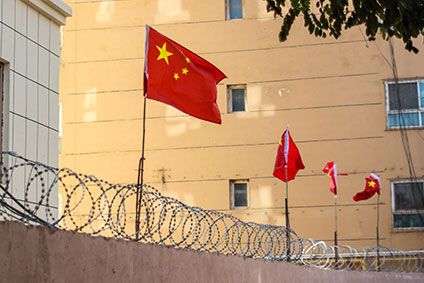
An alliance of NGOs have joined forces to call for an investigation in France of four multinational clothing companies, accusing them of profiting from forced labour imposed on China’s Uyghur population.
The complaint was filed by anti-corruption group Sherpa, the French branch of the Clean Clothes Campaign Ethique, the Uyghur Institute of Europe, and an Uyghur victim, against a large number of brands and distributors in the fashion sector including Inditex, Uniqlo, SMCP and Skechers.
In its complaint, the NGOs say they are exposing “the impunity of transnational corporations that profit from these crimes through their modus operandi and business model.”
Supported by Members of European Parliament Raphaël Glucksmann and Reinhart Butickhofer, as well as by the World Uyghur Congress, the NGOs say they are submitting the complaint to shed light on the role played by multinational companies in the crimes committed against the Uyghur people and to enable French courts to rule on their possible criminal liability.
“Since at least 2019, journalists and researchers have highlighted the existence of systematised forced labour in the Xinjiang Uyghur Autonomous Region by the Chinese government, where nearly 20% of the world’s cotton is produced,” the complaint states.
It is the first of a series of filings organised by ECCHR (European Center for Constitutional and Human Rights) that will be filed in the coming months in other European countries.

US Tariffs are shifting - will you react or anticipate?
Don’t let policy changes catch you off guard. Stay proactive with real-time data and expert analysis.
By GlobalData“This planned series demonstrates that this is not an issue of individual companies but demonstrates how closely and systematically European businesses are involved in the allegedly systematic and state-sponsored forceful exploitation of labour in the XUAR region,” the complaint continues.
The NGOs say that, according to public information available to date, Inditex (including the brands Zara, Bershka, Pull and Bear, Massimo Dutti etc.), Uniqlo, SMCP (including Sandro, Maje, Claudie Pierlot, De Fursac) and Skechers, as well as many other transnational companies, continue to subcontract part of their production or to market goods using cotton produced in the region, thus knowingly taking advantage in their value chain of the workforce in a region where crime against humanity are being perpetrated.
“It is in line with the long-standing advocacy of our organisations to fight against the impunity of transnational corporations and to improve access to justice and remedies for victims. The upcoming draft European legislation on the duty of vigilance, which will be made public by the Commission in the coming months, should address these crucial issues.”
A spokesperson for Uniqlo owner Fast Retailing said: “As a global company, Uniqlo is committed to protecting the human rights of the people in our supply chains. We will continue to focus on providing products that customers around the world can purchase with a sense of trust. As we have confirmed in the past, none of our production partners are located in the Xinjiang Region, and no fabric or spinning mill used in the manufacture of Uniqlo products is located in the area. All Uniqlo items use only cotton that originates from sustainable sources. By definition, sustainable cotton requires that human rights are safeguarded in processing. If we ever find evidence of forced labour or any other serious human rights abuse at any of our suppliers, we will cease to do business with that supplier.”
A spokesperson for Skechers said the company does not comment on pending litigation but pointed to a statement published on its website on Uyghurs that states the company maintains a strict Supplier Code of Conduct governing all of its factories and employs a dedicated Corporate Social Responsibility team that conducts both announced and unannounced audits on all factories with which it has direct relationships.
“The primary objective of these audits is to review on-site labour conditions, generally, and to ensure that none of our factories uses any form of child labour or forced labour, specifically.
“Skechers is deeply concerned by reports of forced labour and the treatment of the members of the Uyghur ethnic minority as well as other ethnic minority workers in the Xinjiang Uyghur Autonomous Region. We fully support the proposal by industry trade associations to find a solution through state-to-state engagements and collaborative partnerships across governments, industries, labour associations and non-governmental organisations.”
Inditex and SMCP did not return a request for comment at the time of going to press.
Just last week, the Ethical Trade Initiative (ETI) urged all businesses to take extra steps to ensure their supply chains are not linked with the Xinjiang Autonomous Region (XUAR), adding audits conducted within the region “cannot be relied upon” and it can be presumed forced labour is at high risk of occurring within any workplace in the region.



